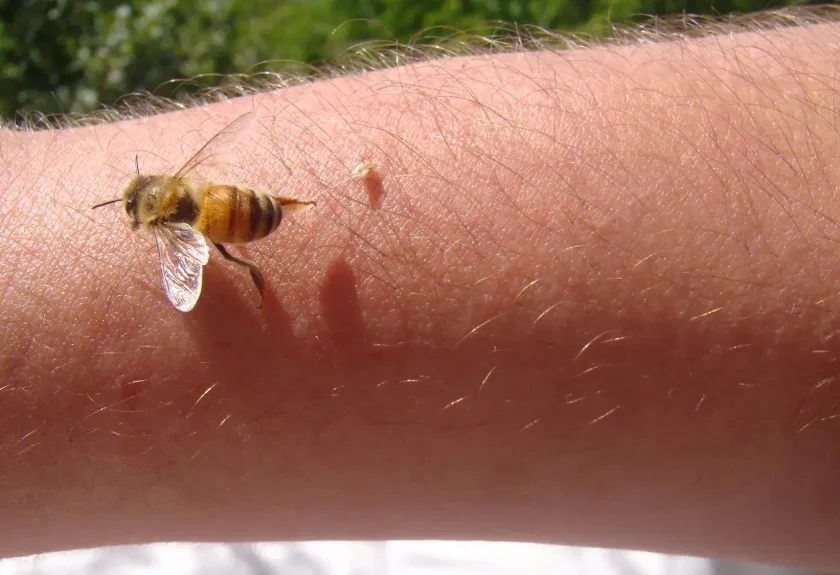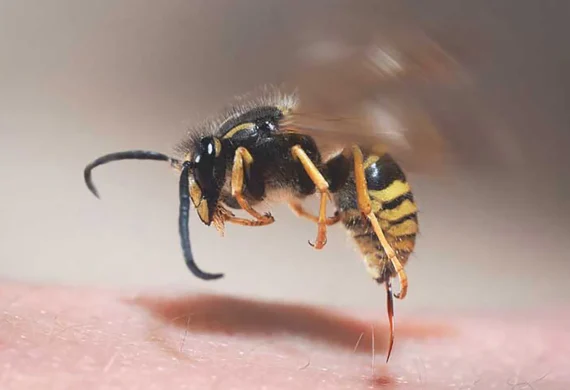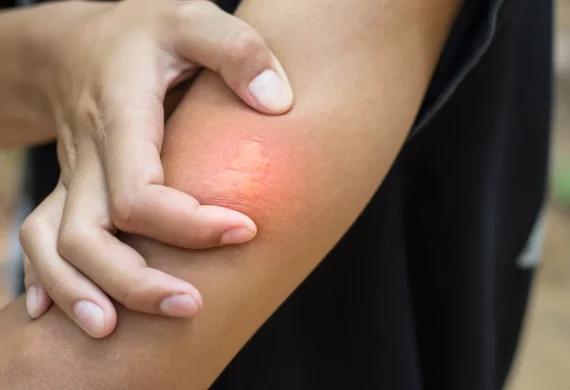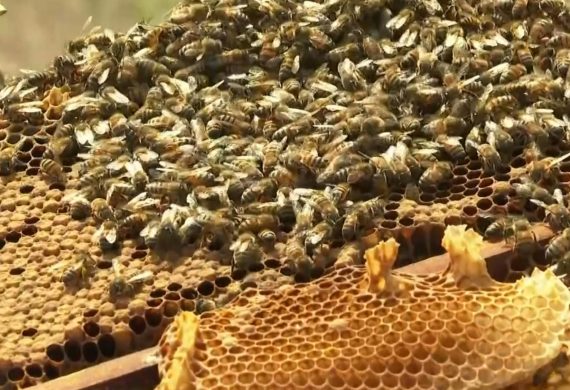Understanding Bee Stings and Immediate Treatment
When Stinging insects attack, immediate proper treatment becomes crucial for preventing complications and reducing pain. Bee stings and wasp sting incidents occur most frequently during warmer months when ambient daytime temperatures and daily temperature fluctuations encourage increased insect activity throughout Canada.
The type of reaction varies significantly based on individual sensitivity, the bee species involved, and whether previous exposure has occurred. Understanding these differences helps determine appropriate treatment methods and when to seek medical attention.
Immediate First Aid Steps
Proper immediate treatment involves a systematic method that addresses both the physical sting and potential complications:
Essential First Aid Protocol
- Remove the stinger immediately using a scraping motion with a credit card or fingernail
- Clean the affected area thoroughly with soap and water
- Apply cold compress or ice pack to reduce swelling and pain
- Take antihistamines to minimize allergic response
- Monitor for signs of severe ALLERGIC REACTIONS or anaphylactic reaction
- Seek immediate medical attention if breathing difficulties or widespread swelling occurs
Recognizing Dangerous Reactions
While most bee stings cause only localized pain and swelling, certain warning signs indicate the need for immediate emergency services:
Emergency Warning Signs
- Difficulty breathing or wheezing
- Swelling of face, lips, or throat
- Rapid pulse or dizziness
- Widespread hives or rash across the body
- Severe nausea or vomiting
- Loss of consciousness
These symptoms may indicate an anaphylactic reaction, requiring immediate professional medical intervention and potentially life-saving treatment.
Types of Stinging Insects and Their Characteristics
Understanding different types of bee and wasps helps predict behavior patterns and potential risks. Each type of bees exhibits distinct characteristics that influence their likelihood to sting and the severity of resulting injuries.
Honey Bee Species and Behavior
Honey Bees represent beneficial insects that play crucial roles in pollination and honey production. These social insects live in organized honey bee colonies led by queen bees and supported by thousands of worker bees and Female worker bees.
Honey Bee Characteristics
- Worker bees collect nectar and pollen using specialized hind legs and hollow basket structures
- Queen bees control colony reproduction and can live for several years
- Honey bee colonies typically establish honey bee nests in hollow trees or artificial bee hive structures
- These insects undergo complete metamorphosis from egg to adult
- Honey bee hives contain honey supers where surplus honey is stored
- Peak activity occurs during honey flow periods when flowers provide abundant nectar
Honey Bees generally display defensive rather than aggressive behavior, typically stinging only when threatened or when protecting their bee colony. Their stingers remain embedded in the victim’s skin, causing the bee to die after stinging.
Wasp Species and Aggressive Behavior
Wasps exhibit more aggressive behavior than Honey Bees and can sting multiple times without dying. Yellow jacket species represent the most commonly encountered aggressive wasps in Canadian environments.
- Wasp colonies build wasps nest structures in various locations including trees, fence posts, and building eaves
- Worker wasps have smooth bodies that allow repeated stinging
- These pests are attracted to sweet foods and protein sources
- Wasp activity increases during late summer when food supply becomes scarce
- Some species display bright colours or blue stripes as warning signals
- Wasp hives can contain thousands of individuals during peak season
The aggressive nature of wasps, particularly when defending their wasp nest, makes encounters potentially dangerous for humans engaging in routine human activity near nesting sites.
When to Contact Professional Pest Control Services
While individual bee stings can often be managed with home treatment, certain situations require intervention from licensed professionals and pest control experts. Recognizing these scenarios helps prevent dangerous encounters and protects both people and beneficial insects.
Situations Requiring Professional Intervention
Professional pest control services become necessary when bee infestation or wasp infestation poses ongoing risks:
Residential Concerns
- Bee nest or wasp nest located near high-traffic areas
- Structural damage or property damage from nesting activity
- Multiple stings occurring during routine activities
- Bee hive establishment in wall cavities or roof spaces
- Wasp bags or nests in children’s play areas
Commercial Property Issues
- Business pest problems affecting customer safety
- Commercial pest control services needs for restaurants or food establishments
- Apartment pest control services for multi-unit buildings
- Severe pest infestations requiring emergency services
- Compliance with federal regulations and safety standards
Professional Treatment Options
Pest control companies offer various specialized services depending on the specific pest issues and common concerns:
- Bee removal services and safe removal techniques that preserve beneficial insects
- Hive removal procedures that relocate colonies to appropriate apiary society locations
- Wasp nest removal and wasp control measures
- Bee exterminator services when removal isn’t feasible
- Wasp exterminators for aggressive species control
- Bee removal specialists trained in species identification and bee keeper coordination
Many pest control companies prioritize eco-friendly pest control methods that protect both human safety and environmental health.
Prevention and Long-Term Management Strategies
Effective prevention involves understanding insect behavior patterns and implementing comprehensive pest prevention plans that reduce encounter risks while supporting beneficial species. Professional pest management professional guidance helps balance safety with environmental responsibility.
Integrated Pest Management Approaches
Modern pest control employs an Integrated Pest Management approach that combines multiple strategies:
Comprehensive Prevention Strategies
- Cultural control methods including proper landscape management
- Chemical control methods when necessary, using appropriate application method Timing
- Selection of treatments based on application method Active ingredient suitability
- Treatment type selection based on specific species and environmental factors
- Monitoring programs during queens Throughout beekeeping season activity periods
- Follow-up visits to ensure treatment effectiveness
Environmental Considerations
Responsible pest treatment considers the broader ecosystem impact, particularly regarding beneficial insects and pollinator conservation:
- Coordination with local bee keeper and apiary society organizations
- Timing treatments to minimize impact on virgin queen and reproductive cycles
- Avoiding damage to trees and natural habitats
- Proper management of compost piles and potential nesting sites
- Understanding temperatures and seasonal patterns affecting insect behavior
- Consideration of agriculture visit theAntimicrobial resistance implications
Professional pest control technician teams understand these complex relationships and can implement solutions that protect both human safety and ecological balance.
Advanced Treatment Methods and Technologies
Modern pest control utilizes sophisticated pest control tools and advanced techniques that improve both safety and effectiveness. Professional services offer access to specialized equipment and expertise unavailable to general consumers.
Professional Equipment and Techniques
Licensed professionals utilize specialized equipment designed for safe and effective pest management:
Advanced Service Capabilities
- Specialized protective equipment for approaching active wasp nest sites
- Precision application tools for targeted treatment methods
- Monitoring systems for tracking insect activity patterns
- Relocation equipment for safe removal of beneficial species
- Environmental monitoring to assess ecosystem impact
Seasonal Service Programs
Comprehensive pest control involves annual pest control maintenance programs that adapt to seasonal patterns:
- Spring preparation during early season activity increases
- Summer monitoring during peak wasp activity periods
- Fall management as food supply decreases and aggression increases
- Winter planning for property pest prevention measures
- Year-round same-day and emergency pest control availability
These programs provide consistent protection while adapting to changing environmental conditions and insect behavior patterns throughout the year.
Why Choose Top Choice Pest Control?
In Canada’s competitive pest control market, Top Choice Pest Control distinguishes itself through superior technical expertise, comprehensive service offerings, and unwavering commitment to customer safety and satisfaction. Our position as a leading reliable pest control company reflects years of successful pest management and customer service excellence.
Industry-Leading Expertise and Qualifications
Top Choice Pest Control maintains the highest standards of professional service through comprehensive training and certification:
Professional Excellence Features
- Licensed professionals trained in Bee and Wasp behavior and safety protocols
- Specialists in Bee & Wasp Extermination and safe removal techniques
- Animal control specialist coordination for complex wildlife situations
- Comprehensive pest control tools and modern diagnostic equipment
- Emergency services and same-day and emergency pest control availability
- Expertise in both residential and commercial pest control services
Comprehensive Service Portfolio
Unlike smaller competitors such as Pestend Pest Control, Pestend Pest Control London, Prime Pest Control, A1 Pest Solutions Inc, Peregrine Pest Control, Kitchener Waterloo Pest, or Pest Solutions Inc, Top Choice Pest Control offers unmatched service breadth:
- Affordable pest control with transparent pricing and no hidden fees
- Eco-friendly pest control methods that protect beneficial species
- Comprehensive pest prevention plans tailored to individual property needs
- Professional pest control service backed by industry certifications
- Specialized bee removal services that prioritize species conservation
- Wasp control and wasp nest removal expertise
Customer-Focused Service Approach
Top Choice Pest Control prioritizes customer safety and satisfaction through personalized service delivery:
- Detailed consultation and property assessment services
- Customized treatment methods based on specific pest issues
- Ongoing support and Follow-up visits to ensure treatment effectiveness
- Educational resources about pest prevention and safety
- Coordination with healthcare providers for ALLERGIC REACTIONS management
- 24/7 emergency services for urgent situations
This comprehensive approach ensures that customers receive not just pest control, but complete peace of mind and ongoing protection for their families and properties.
Conclusion
Proper bee stings treatment combines immediate first aid with professional pest control expertise when needed. Top Choice Pest Control’s comprehensive approach ensures both human safety and environmental responsibility through licensed professionals, eco-friendly pest control methods, and emergency services availability. When Stinging insects threaten your property or safety, trust Canada’s leading pest control companies for effective, responsible solutions that protect both your family and beneficial insects.







